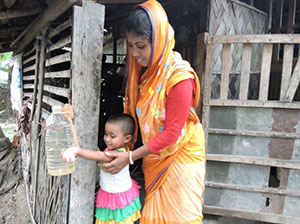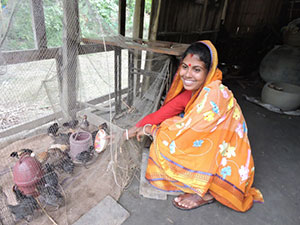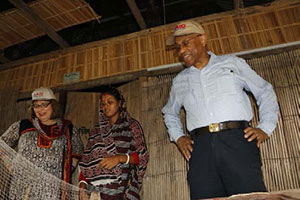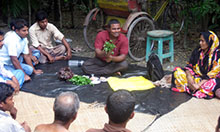One woman’s transformation from student to advocate

Aporna Shikder, a 23-year-old married mother of one, enrolled in a US Agency for International Development (USAID) Farmer Nutrition School (FNS) in 2014. Prior to this time, she relied on her husband’s work as a day laborer to make a living and feed the family. “My husband was the only earning source in our family and his income was very poor. During my pregnancy I had very little opportunity to have good meals,” she says.
Thanks to the FNS, which is implemented by SPRING, Ms. Shikder is getting more out of her poultry rearing operation after learning new techniques like providing vaccinations for healthier chicks. The poultry farm provides a valuable source of protein—Aporna is now able to feed her daughter five eggs each week. She has even been able to sell a few of her extra chickens to earn extra money.
My success has inspired those around me and I encourage my neighbors to follow the same path.
-Aporna Shikder, Community Nutrition Champion

Farmer nutrition schools also teach the importance of household hygiene. In rural Bangladesh, most kitchens or bathroom facilities are not equipped with sinks for handwashing. Here, Aporna and her two-year-old daughter demonstrate how they use a tippy tap—a simple, homemade device that dispenses clean water for people to wash their hands.
In addition, Aporna learned to make better use of the fallow land around her homestead by growing nutritious vegetables like sweet gourd (squash), string beans, and leafy greens to feed her daughter and other family members. She is also able to sell surplus produce in the nearby marketplace and save this income for her family.
After graduating from her nine-month training program, Aporna earned the distinction of becoming a “Community Nutrition Champion.” Now, she serves as a volunteer to spread information about proper nutrition and hygiene in her neighborhood. Recently, she was nominated to represent her village as a member of the community support group for the nearby community health clinic. “My success has inspired those around me and I encourage my neighbors to follow the same path.”

Aporna was able to show off her new food production and improved nutrition practices when the Acting Administrator of USAID, Ambassador Alfonso E. Lenhardt, visited her village of Kathalbari in Bagerhat district of Southern Bangladesh in August 2015. Ambassador Lenhardt had the chance to see her improved poultry rearing and beautiful garden, and even had a chance to try out one of Aporna's tippy taps.
Aporna is one of 101,245 women who have benefited from 5,141 SPRING-implemented farmer nutrition schools across 40 upazilas in Barisal and Khulna divisions. Each has gained insights into new ways to improve her own and her family members’ lives through simple but demonstrably better approaches to household agriculture, hygiene, and nutrition.
